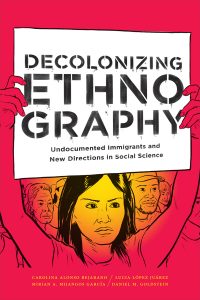In Decolonizing Ethnography: Undocumented Immigrants and New Directions in Social Science, Carolina Alonso Bejarano, Lucía López Juárez, Mirian A. Mijangos García and Daniel M. Goldstein present collaborative research on the rights of undocumented migrants in New Jersey, USA, utilising an alternative approach to ethnography that seeks to position it as a powerful tool of self-empowerment, public advocacy and personal transformation. By reworking notions of participation and authorship, the book illustrates an excellent attempt to decentre and reassess the traditional models of doing social research through a decolonial framework, writes Kheira Arrouche.
Decolonizing Ethnography: Undocumented Immigrants and New Directions in Social Science. Carolina Alonso Bejarano, Lucía López Juárez, Mirian A. Mijangos García and Daniel M. Goldstein. Duke University Press. 2019.
 ‘The intellectual project of decolonizing has to set out ways to proceed through a colonizing world. It needs a radical compassion that reaches out, that seeks collaboration, and that is open to possibilities that can only be imagined as other things fall into place. Decolonizing Methodologies is not a method for revolution in a political sense but provokes some revolutionary thinking about the roles that knowledge, knowledge production, knowledge hierarchies and knowledge institutions play in decolonization and social transformation’ (Linda Tuhiwai Smith, 1999).
‘The intellectual project of decolonizing has to set out ways to proceed through a colonizing world. It needs a radical compassion that reaches out, that seeks collaboration, and that is open to possibilities that can only be imagined as other things fall into place. Decolonizing Methodologies is not a method for revolution in a political sense but provokes some revolutionary thinking about the roles that knowledge, knowledge production, knowledge hierarchies and knowledge institutions play in decolonization and social transformation’ (Linda Tuhiwai Smith, 1999).
An interest in exploring the rights of undocumented immigrants in New Jersey, USA, has yielded an exciting new co-authored book, Decolonizing Ethnography, written by immigrant activists Lucía López Juárez and Mirian A. Mijangos García with Dr Carolina Alonso Bejarano and Professor Daniel M. Goldstein. In response to the increasing calls for the decolonisation of anthropology, the book contributes to ongoing debates concerning the discipline’s foundations and the need to think beyond the Western methodological canon. It offers an innovative way in which ethnography, practised by the people who have been traditionally positioned as the ethnographic research objects, can be a powerful tool of self-empowerment, public advocacy and personal transformation.
The significant departure point for the decolonisation of ethnographic research in this book entails a powerful assessment of the approach’s history as well as its traditional norms. Central to the authors’ research process is the methodological reassessment that decolonising anthropology, and more precisely ethnography, requires. The authors join earlier scholars in the debate on the coloniality inherited in the discipline of anthropology and its colonial legacy. They present a critical review of the history of anthropology, exploring the nexus between coloniality, colonialism and the anthropological knowledge produced. The authors claim that the inherent coloniality embedded in anthropology and its methods serves to maintain colonialism, supporting their stance through evidencing various aspects of the endurance and dominance of coloniality and its implications in the world today. This enables the reader to understand the entire structure of racialised, gendered power and social inequality within which ethnographic research has been and continues to be conducted (7).
The authors stress that only through a decolonial lens can we identify the interplay of racism, patriarchy, gender and class as discursive categories that have shaped the past and present coloniality of the contemporary world. In this vein, decolonising means the process of dismantling the traditional ground of research that has long been defined by the West, practised through ways of thinking that are unreflexively infused with Western power and perpetually reinscribe Western forms of knowledge, representation and authority. The authors also discuss several anti-colonial research approaches such as feminism and collaborative ethnography. They highlight their importance and attempt to push back at the dominance of coloniality in anthropology and inequities in established modes of research practice. These approaches have fed into activist theory, which inspired the co-authors to start their journey towards decolonisation.

The book brings into sharp focus the conventional practices of ethnographic research and how ethnographers still encounter colonial inheritance and ideology in doing fieldwork. Decolonising ethnography as a discipline requires full awareness of these colonial legacies that an ethnographer may face. Offering a way to tackle these potential pitfalls in ethnographic research, the book provides extensive alternatives introduced by anthropologists to deconstruct ethnographic research, such as new and engaged forms of research that put an end to the subject/object dichotomy on which much contemporary science is founded. The authors also discuss in detail the ethnographer’s supremacy over the object’s world, which raises questions regarding researcher analyses of data and the representation of the population studied, especially considering the narrow scholarly canon and its Eurocentric perspective. Another notable issue in decolonising ethnographic research is the authorship question. The authors call for full recognition of the contribution made by fieldwork collaborators, which is a significant step towards encouraging researchers to learn from others through mutual engagement rather than merely extracting data from them.
The particular valuable contribution I see in this book is decolonising ethnographic research on undocumented immigrants in New Jersey. Such a research focus is filled with manifold obstacles when exploring the field world of undocumented migrants who are already living a marginalised life, under illegality, exploitation and violence. The book traces the evolution of Latin American undocumented immigration to the area and the restrictive instruments implemented by the state over its different towns that have left a liminal space for the migrants to live in. The authors firmly believe that research under these circumstances is more likely to endanger undocumented people in an abusive securitised system, fuelling the toxic narrative on undocumented migration. This requires the authors to explore alternatives to make ethnographic research a decolonial instrument for the population of the study.
As a decolonial step, the authors aim to make ethnographic research a tool of self-empowerment, inviting Mirian and Lucy, as activists for immigrant rights, to join and take the lead of the research project. Through such a mutual engagement with the community studied, Lucy and Mirian reinforce their activism while simultaneously developing their research skills as ethnographers, contributing to knowledge production that better articulates the migrant’s conditions. An even more important contribution is the transformation of the conventional ethnographic subject into a source provider of theory (undocumented activist’s theory) as well as the whole research project into a ‘new instrument of social resistance, transformation, and liberation’ (100).
The authors acknowledge that the decolonial battle needs to apply a sharp lens to all levels of the research process. The authors’ research methodology was mainly linked to the practical intent to rethink and transform the actual inequities found in the research area, starting from theory to data collection and, finally, the dissemination of findings. The research team agreed to use drama as a tool of political engagement and for the dissemination of the findings on immigrant workers’ rights. In effect, a bilingual play (in Spanish and English) embodying Mirian’s experience of a work accident was developed to echo themes including migrants’ work incidents, fears of deportation, separation from family and undocumented migrant rights. The play is a moving production based on a real story and conveys a powerful message that ‘under U.S law everyone has rights as workers regardless of their immigration status’ (106). The play aims to raise migrants’ awareness about joining their efforts to claim and fight for their violated rights and the consequences of not doing so, because ‘being undocumented does not mean having no rights’ (87).
All in all, Decolonizing Ethnography illustrates an excellent attempt to decentre and reassess the traditional models of social research through a decolonial approach, especially in the study of a contemporary sensitive topic such as immigration in the context of the United States. Despite the challenges, it does the job well by making this ethnographic research relevant to and in support of the community of study. The researchers demonstrate a high self-reflexivity at all levels of the research process by discussing their roles as researchers or activists, their positionality and their subjectivities. The core contributions and positive impact of their decolonial approach are ‘enabling local people – historically the objects of research – to become subjects in the research process and to use the knowledge they produce to advance their own decolonizing struggles’ (148). The journey of decolonisation seems to be one of thousands of miles, yet this insightful and highly recommended book offers a creative step to begin the journey of liberation in all disciplines.
- This review originally appeared at the LSE Review of Books.
- Image Credit: Gore Street graffiti mural, ‘Decolonize’, Sault Ste. Marie, Ontario (Fungus Guy CC BY SA 4.0).
Please read our comments policy before commenting.
Note: This article gives the views of the authors, and not the position of USAPP– American Politics and Policy, nor of the London School of Economics.
Shortened URL for this post: https://bit.ly/2Yxd3ia
About the reviewer
Kheira Arrouche – Leeds University
Kheira Arrouche is a PhD student at Leeds University, School of Sociology and Social Policy. Kheira’s research examines West African irregular migration through the Maghreb region with particular focus on their stage of migration in Algeria.






